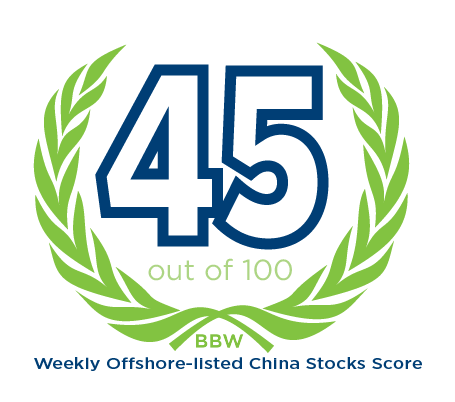CHINA BULLETIN: China Rallies Consumers, Banks, Huijin and Foreigners to the Economic Cause


In this week’s issue exports keep falling, tourism rebounds and Country Garden and Evergrande leave creditors guessing. On a scale of 1 to 100, we give the week a 45 for offshore-listed China stocks.
Doug Young, Editor in Chief
You can sign up to get China Bulletin weekly in your inbox.
MACRO
China Rallies Consumers, Banks, Huijin and Foreigners to the Economic Cause
Beijing was calling on just about everyone to do their part to prop up China’s sputtering economy last week. It called on consumers to buy more cars and banks to assist in financing. It called on Huijin, one of its biggest sovereign wealth investors, to buy shares of the nation’s four biggest banks. And it even called on foreigners to buy more of its offshore sovereign debt.
The steady series of calls to arms has a slightly coordinated feel to it, showing that Beijing is taking the slowing economy more seriously and trying to prop things up on multiple fronts. Unfortunately, the property sector that’s been dragging the broader economy down is likely to prove even more powerful than all these other various efforts.
Export Keep Sliding as Deflation Pressure Remains
Two big economic indicators last week showed China’s exports continued to contract, while the country also teetered on the brink of deflation. Exports fell 6.2% in September, marking a fifth consecutive month of declines. Meantime, the country’s consumer price index was unchanged, while the producer price index fell for a 12th straight month.
Some are noting that things could have been worse, as economists were mostly forecasting bigger declines in trade, though they were looking for a slight rise in inflation. Year-ago comparison figures are also quite weak since China was in the midst of its brutal Covid controls at this time last year. That means the latest declines could have been even worse if not for weak numbers last year.
China Stocks Make Big Gains, Only to Give Them Back
Offshore-listed Chinese stocks posted big gains in the first four days of last week as people returned from the long National Day holiday, only to give most of those back on Friday after the weak export and inflation data came out. The Hang Seng China Enterprises Index rose 2.4% during the week, while the iShares MSCI China ETF rose 0.1%. The broader Hang Seng Index rose 1.9%.
This week’s cycle is becoming all too common in China these days. People get excited when Beijing announces new initiatives to prop up the economy, often calling on banks and other state-owned entities to join the cause. But then new data comes out showing things are still bad, effectively killing any positive sentiment.

Industry
Tourism Rebounds Past Pre-Pandemic Levels
One factor behind the stock market rally early last week was data from the weeklong National Day holiday, which showed that spending this year actually surpassed pre-Covid levels in 2019. The increase wasn’t huge, with tourism revenue over the period up 1.5% from 2019. But, hey, any gain in this kind of climate should be cause for some celebration.
The reality is that this year’s holiday contained eight days, one more than usual, due to the inclusion of the annual Mid-Autumn Festival holiday that coincided with the National Day period this year. And truth be told, many Chinese would probably rather be anywhere than at home right now, as they look for ways to escape the increasing economic gloom of their daily lives.
Evergrande, Country Garden Leave Creditors Guessing
The ongoing sagas of China’s two poster children for its struggling property market marched on last week, with developments that left creditors mostly scratching their heads. One report said Evergrande creditors were “left in the dark,” after a scheduled restructuring meeting was scrapped. Meantime, Country Garden finally fessed up that it can’t meet all of its offshore debt obligations.
Both stories have overtones of some behind-the-scenes maneuvering, and we suspect that each company is bargaining fast and furiously with the central government to stave off its own collapse. Beijing seems to blow hot and cold over this pair, at some times wanting to save them while at others appearing to leave them to fend for themselves.
Samsung, Hynix Get U.S. Waivers for Their China Chip Plants
The latest U.S. actions in its war on China’s chip sector took a new twist last week, as Washington granted official waivers to South Korean chip giants Samsung and SK Hynix, allowing them to equip their Chinese facilities. Here it’s noteworthy that the exemptions are going to non-Chinese chip companies that just happen to be manufacturing in China, and not to Chinese companies.
It’s also quite likely that neither Samsung nor Hynix are producing their most cutting-edge chips in China, and are doing that at home. So, whatever equipment they export to China as a result of this waiver will probably be one or two generations old, which shows the U.S. is becoming more targeted in its approach by allowing China to obtain older chip technology.

Company
India Turns Up the Heat on Vivo
The U.S. isn’t the only country that’s getting tough on China tech. A far less visible story involves India, which is making life miserable these days for Chinese brands that now dominate the world’s second-largest smartphone market. In the latest twist, Delhi has accused leading brand Vivo of illegally obtaining visas for some of its workers, and illegally traveling to sensitive areas.
India also arrested a top Vivo official over money laundering accusations. This all occurred as India accuses Vivo and most other Chinese smartphone makers of tax evasion, and has frozen huge sums of their money until the disputes are resolved. This latest twist looks like the start of a new chapter in the story, and we wouldn’t be surprised to see Chinese brands start to pull back from the market.
XPeng Suspends Supply Chain Chief
Beijing isn’t the only one on a hunt for corrupt officials. Xpeng, one of China’s leading homegrown new energy vehicle (NEV) makers, made headlines last week after it suspended its supply chain chief, Li Feng, on suspicion of corruption. We suspect that Li will ultimately be handed over to the police and spend the next few years in jail alongside similarly corrupt government officials.
The fact of the matter is that someone in Li’s position has huge leverage over his company’s many suppliers, and is very prone to corruption as those suppliers offer lavish gifts and other incentives to buy their products. We’ve seen similar actions in the past from other private companies, but many probably choose to keep this type of thing quiet to avoid reputational damage.
Imax China Shareholders Nix Buyout
This was one show-stopper that global large-screen cinema operator Imax didn’t see coming. The Canadian company made an offer earlier this year to privatize its China unit, Imax China, after the company’s shares failed to excite investors over their eight years of trading. But then some investors decided they didn’t like the buyout price and killed the deal.
In fact, the buyout premium was relatively small, at around 10%. But Hong Kong, which is where Imax China trades, also has rules that set a very high bar for buyouts, allowing even small groups of investors to sink such deals. That differs quite a bit from the U.S., where minority shareholders have very little power to stop similar buyout offers.
AND FROM THE PAGES OF BAMBOO WORKS
| Hong Kong Weighs Saying ‘So Long’ to Stormy Weather Trading Halts Last week we took a look at a quirk of Hong Kong’s stock market, which closes whenever typhoons near the city. Such a policy makes sense when people needed to trudge to work each day. But it makes less sense – and costs the stock exchange and city big money – when people can easily trade online from the comfort of their homes. Responding to the current reality, the city and stock exchange are doing the once-unthinkable and examining the possibility of allowing trading to go on during such stormy weather. The move would be part of a broader attempt to boost anemic trading volumes in Hong Kong, which have sunk to some of their lowest levels in years on pessimism about the Chinese economy. |
| Smaller Developers Suffer in Silence We also shined our spotlight on some of China’s unsung smaller property developers, which are suffering as much as, if not more than, the big boys like Evergrande and Country Garden as the nation’s real estate market goes through a painful correction. Names like Yuzhou, Aoyuan and Times China are all suffering with massive losses – and tanking stocks in Hong Kong. But unlike the Evergrandes and Country Gardens, this group is probably very low priority on China’s list of companies to assist as they try to work through their own crises, including defaults and projects that remain unfinished due to lack of funds. Most of their stocks now trade at less than HK$1, and we suspect that most will never rise above that level again. |






